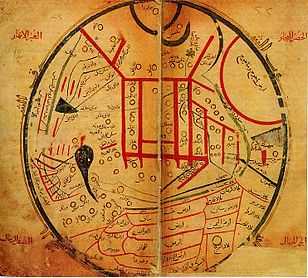Mahmud al-Kashgari
| Maḥmūd al-Kāšġarī محمود الكاشغري | |
|---|---|
| Born |
1005 Kashgar, Qara-Khanid Khaqanate |
| Died |
1102 Upal, southwest of Kashgar, Qara-Khanid Khaqanate |
| Residence | Kashgar |
| Fields | Linguistics, Lexicography, Turkology |
Mahmud ibn Hussayn ibn Muhammad al-Kashgari (Arabic: محمود بن الحسين بن محمد الكاشغري - Maḥmūd ibnu 'l-Ḥussayn ibn Muḥammad al-Kāšġarī; Turkish: Kâşgarlı Mahmud; Uyghur: مەھمۇد قەشقىرى) was an 11th-century Muslim Uyghur scholar and lexicographer of Turkic languages from Kashgar.
His father, Hussayn, was the mayor of Barsgan, a town in eastern-southern part of Issyk Kul lake (nowadays village of Barskoon in Northern Kyrgyzstan's Issyk Kul region) and related to the Qara-Khanid ruling dynasty. Some modern writers think that his mother, Bibi Rābiy'a al-Basrī, was allegedly of Arab origin.
Work
Al-Kashgari studied the Turkic languages of his time and wrote the first comprehensive dictionary of Turkic languages, the Dīwānu l-Luġat al-Turk (Arabic: "Compendium of the languages of the Turks") in 1072-74.[1] It was intended for use by the Caliphs of Baghdad, the new, Arabic allies of the Turks. Mahmud Kashgari's comprehensive dictionary, later edited by the Turkish historian, Ali Amiri,[2] contains specimens of old Turkic poetry in the typical form of quatrains (Persio-Arabic رباعیات rubāiyāt; Turkish: dörtlük), representing all the principal genres: epic, pastoral, didactic, lyric, and elegiac. His book also included the first known map of the areas inhabited by Turkic-speaking peoples. This map is housed at the National Library in Istanbul.[3] He advocated monolingualism and the linguistic purism of the Turkic languages, and held a belief in the superiority of nomadic people. Most of his Turkic-speaking contemporaries, however, were bilingual in Tajik, which was the prestige language of Central Asia, as well as its indigenous language before forced Turkification.[4]
One of al-Kashgari's most famous poems relates to the Turko-Islamic conquest of the Buddhist, Tocharian Kingdom of Khotan:
We came down on them like a flood!
We went out among their cities!
We tore down the idol-temples,
We shat on the Buddha's head![5]
Death
Some researchers think that Mahmud al-Kashgari died in 1102 at the age of 97 in Upal, a small city southwest of Kashgar, and was buried there. There is now a mausoleum erected on his gravesite. But some modern authors reject such a data, saying that the date of his death is just unknown.
He is claimed by Uyghur, Kyrgyz, and Kazakh nationalists as part of their respective ethnic groups.[6]
An oriental study university, situated in the capital city of Bishkek in post-Soviet Kyrgyzstan, was named after Makhmud Kashghari, in the 1990s.
See also

- Yusuf Balasaghuni
References
- ↑ Kemal H. Karpat, Studies on Turkish Politics and Society:Selected Articles and Essays, (Brill, 2004), 441.
- ↑ Ali Amiri, R. Mantran, The Encyclopaedia of Islam, Vol. I, ed. H.A.R. Gibb, J.H. Kramers, E. Levi-Provencal and J. Schacht, (E.J. Brill, 1986), 391.
- ↑ Roudik, Peter, The History of the Central Asian Republics, (Greenwood Press, 2007), 175.
- ↑ Sengupta, Anita (2003). The Formation of the Uzbek Nation-State: A Study in Transition. Lexington Books. pp. 136–137. "The most elegant of the dialects belongs to those who know only one language, who do not mix with Persians and who do not customarily settle in other lands. Those who have two languages and who mix with the populace of the cities have a certain slurring in their utterances.... The most elegant is that of the Khagani kings and those who associate with them."
- ↑ Elverskog, Johan (2010). Buddhism and Islam on the Silk Road. University of Pennsylvania Press. p. 95. ISBN 978-0-8122-4237-9.
- ↑ But some Uyghur authors consider him a member of their own ethnic group. Makhmud Kashghari himself considered the Uyghurs of his own time as the eastern neighbours of his country (the Qarakhanid khanate). See, for example, Dwyer, Arienne (2005). The Xinjiang Conflict: Uyghur Identity, Language Policy, and Political Discourse. Political Studies 15. Washington: East-West Center. p. 73. ISBN 1-932728-29-5: "the Uzbeks, Uyghurs, and Kyrgyz all claim Mahmud al-Kashgari, the well-known 11th century scholar, as their own."
External links
| Arabic Wikisource has original text related to this article: |
| ||||||||||||||||||||||||||||||||||
|